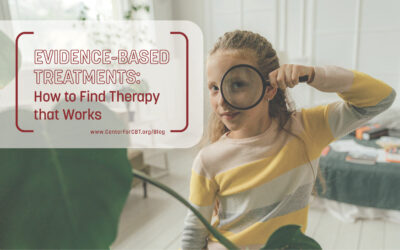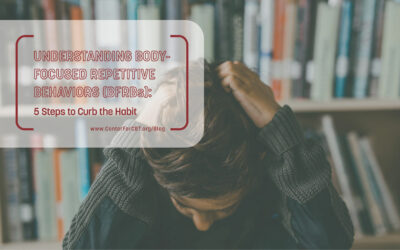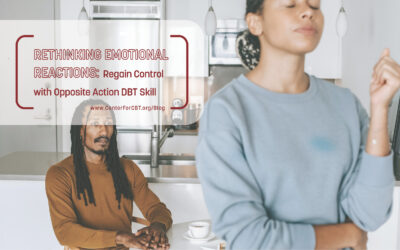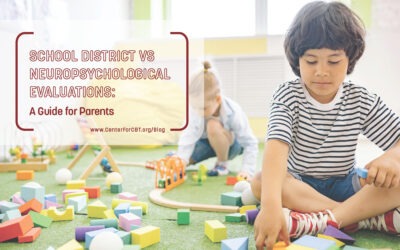Blog
Both parenting a child and being a child are tall orders in today’s climate, and we would like to offer this page as a resource for support and information to help you and your family. We will be sharing tips and strategies to navigate the numerous challenges that come with raising caring and courageous youth. Our goal is to add new material that ranges from original content, to great reads and videos from other experts, as well as articles in the mainstream media that offer additional insight.
We welcome your suggestions and feedback, and want to cover a variety of topics to help you and the community learn more. We encourage you to reach out if there are topics you would like us to cover, and questions you would like answered. And, if you find what you see to be helpful, please like our page on Facebook (@CenterForCBT) and tell your friends and family to do the same! We are very excited to be starting this project, and look forward to sharing this information with you.
Evidence-Based Treatments: How to Find Therapy that Works
Choosing an evidence-based treatment (EBT) approach to therapy has a big impact on the quality of the services you receive and the results you see. Evidence-based treatments are research-supported approaches that are shown to be effective in addressing specific needs. Choosing to work with a provider who offers cognitive behavior therapy (CBT), dialectical behavior therapy (DBT), or another tested method can help you meet your therapy goals.
DBT FAST Skill: 4 Tips for Maintaining Self-Respect
Interpersonal effectiveness skills are a set of strategies taught in DBT which include the FAST skill to maintain self-respect. When you are faced with a challenging social interaction, the DBT FAST skill reminds you to be fair to yourself and others, not apologize for feeling how you feel, and stay true to your values. Practicing the DBT FAST skill can help you learn to act in a way that makes you feel positively about yourself and maintain a sense of self-respect.
Back to School Organization: 5 Skill Sets to Practice with Your Student
Back to school season is the perfect time to practice organizational strategies. Practicing these skill sets is helpful for the school year ahead, and will also reinforce good habits that your student can use for success and independence in adulthood. Teaching goal setting, time management, and other organizational skills training strategies are key for parents and educators helping children and teens learn how to confidently navigate new responsibilities.
Parenting Without the Power Struggle: 5 Steps for Effective Instruction Delivery
Delivering clear, effective instructions can significantly increase your child’s ability to listen and respond while reducing conflict, frustration, and power struggles. These parenting strategies can help you learn how to offer praise and support your child to help them follow instructions.
Body-Focused Repetitive Behaviors (BFRBs): 5 Steps to Curb the Habit
Body-focused repetitive behaviors (BFRBs) can include persistent behaviors like hair pulling or skin picking. Conditions like trichotillomania and dermatillomania can be distressing and difficult habits to break, but they are treatable. Through collaboration with a trained CBT psychologist, individuals can learn and practice the key steps in habit reversal training (HRT) to curb these habits and find relief.
Rethinking Emotional Reactions: Regain Control with Opposite Action DBT Skill
Opposite Action is a DBT skill that can be used by adults, teens, and kids to help them control big emotions. When you feel a strong emotional urge, Opposite Action reminds you that acting in the opposite way of what your emotions are telling you can actually be helpful in some situations. This practice challenges the automatic link between emotion and behavior to help you respond thoughtfully even when we’re feeling overwhelmed.
Feeding Disorders vs. Eating Disorders: 4 Key Differences to Look For
Feeding disorders and eating disorders are terms which are often used interchangeably. However, there are distinct differences between these two diagnoses. Key factors, such as motivation, age of onset, behavioral features, and the emotions experienced with these disorders can help determine a diagnosis. An accurate assessment is the first step to identifying which evidence-based treatments will best support the needs of your child.
School District vs Neuropsychological Evaluations: A Guide for Parents
School-based evaluations and comprehensive neuropsychological evaluations both aim to identify learning and developmental needs. You may consider pursuing an evaluation if you have concerns for your child’s cognitive abilities, school performance, or behavioral problems. It’s important to understand the key differences between these evaluations so that you can decide on the best next step to help your child succeed.
Creating a Healthy Work Environment: 4 Ways to Promote Productivity
Dissatisfaction in one’s performance can lead to feelings of self-doubt, which reduces productivity and intensifies those negative feelings. An important step in breaking this cycle is creating a work environment that will help you meet your goals. These strategies can be used by parents, children, adolescents, and young adults.









